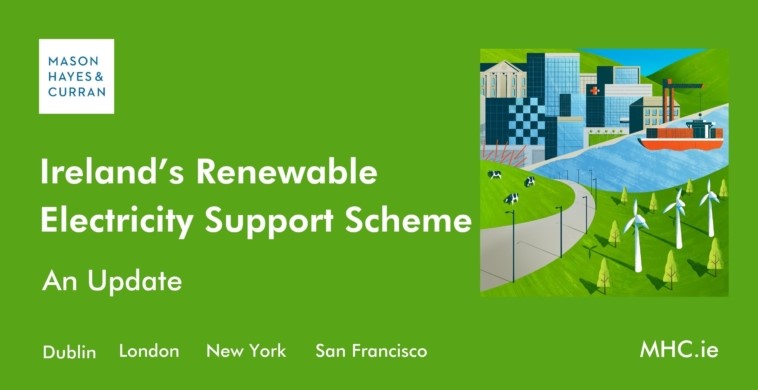
The Irish government has committed, through the Climate Action Plan, as published in 2019 and updated in 2021, to an increased renewable electricity target of 80% by 2030 “where achievable and cost effective, without compromising security of electricity supply”. To help achieve this, the Department of the Environment, Climate and Communications (DECC) recently announced a schedule of onshore and offshore Renewable Electricity Support Scheme (RESS) auctions out as far as 2025. These are intended to procure a total indicative volume of up to 49,000 GWh. The schedule includes the recently launched second onshore RESS auction (RESS 2), as well as a series of offshore (ORESS) auctions.
This indicative schedule is as follows:
RESS Auction Type |
Indicative Auction Volume (GWh) |
Indicative Auction Dates |
Onshore RESS 2 |
1,000-3,500 |
Q2 2022 |
Offshore ORESS 1 |
7,500-10,000 |
Q4 2022 |
Onshore RESS 3 |
2,000-5,500 |
Q2 2023 |
Offshore ORESS 2 |
15,000-25,000 |
2024-2025 |
Onshore RESS 4 |
1,000-5,000 |
2024 |
The schedule sets a very high level of ambition in the coming years in terms of both volumes and timelines. While this is welcomed, it remains to be seen whether these ambitious timelines can be achieved in practice, particularly as regards the new and relatively complex process for consenting and supporting offshore wind.
RESS 2
On 27 October 2021, DECC published the final terms and conditions for RESS 2. The qualification window opened on 7 December 2021, and the deadline for receipt of qualification applications through the RESS portal fell on 13 January 2022. Key milestones in the RESS 2 process are:
Milestone |
Interim Milestone Date and consequences for failure to meet Interim Milestone Date |
Final Milestone Date and consequences for failure to meet Final Milestone Date |
The Generator shall submit evidence satisfactory to the Minister that the Generator has accepted and signed a Grid Connection Agreement and to submit to the Minister the Grid Connection Agreement reference number. |
If not complete by 30 June 2023, the Minister will be entitled to drawdown up to a maximum of 25% of the Performance Security, 4% per month. |
If not complete by 31 December 2023, the Letter of Offer will be revoked, and the remaining portion of the Performance Security will be drawn down. |
The Generator shall submit a declaration to the Minister confirming that funding to construct the RESS 2 Project and achieve Commercial Operation is in place in respect of the RESS 2 Project. |
If not complete by 31 December 2023, the Minister will be entitled to drawdown up to a maximum of 25% of the Performance Security, 4% per month. |
If not complete by 30 June 2024, the Letter of Offer will be revoked, and remaining portion of the Performance Security will be drawn down. |
The Generator shall achieve Commercial Operation. |
If not complete by 31 December 2024, erosion of the contract term equivalent to the period of time between 31 December 2024 and Commercial Operation Date. |
If not complete by 31 December 2025, Letter of Offer will be revoked, and remaining portion of the Performance Security will be drawn down. |
The final RESS 2 terms and conditions (RESS 2 T&Cs) remained largely consistent with those published in draft form in June 2021 (Draft RESS 2 T&Cs). They are broadly similar to the RESS 1 terms and conditions, save for the removal of the Solar Preference Category and the inclusion of hybrid projects. See our earlier article: RESS 2 terms and conditions - what are the key changes compared to RESS 1. Significant changes in the final RESS 2 T&Cs and other points to note include:
- Citizen’s Investment Scheme – Although DECC had hoped to incorporate some form of a citizen/community investment in RESS 2, the RESS 2 T&Cs do not incorporate such a scheme. The Community Benefit Fund contribution of €2 per MWh, as featured in RESS 1, has been maintained.
- Indexation –DECC has maintained the position of not indexing Strike Prices against inflation, on the basis that it has not found any evidence provided by respondents “to be sufficiently compelling to change the status quo from RESS 1, however the issue will remain under consideration for the wider RESS and ORESS programme”. DECC’s stated position remains that for RESS 2, inflation risks are better borne and managed by the development/generation side of the market.
- Bonds - In a welcome change for developers, the value of the bonds required to be posted by each applicant was reduced from:
- €7 per MWh to €6 per MWh for bid bonds, where the MWh value is the project’s “deemed energy quantity” for one year.
- €24 per MWh to €20 per MWh for performance bonds. By way of DECC’s worked example, this equates to an approximate €40,000, or 17%, reduction for a 10MW solar project relative to the equivalent requirement Draft RESS 2 T&Cs.
- Director Declarations – The director declarations required to be submitted as part of the RESS 2 Application for Qualification are, for the most part, consistent with the RESS 1 director declarations. However, some points are worth noting:
- The grid connection declaration has been amended to include additional confirmations to ensure, amongst other issues, that any grid connection modification does not reduce the maximum export capacity below the intended Offer Quantity for the project.
- A new declaration is required to confirm that the relevant RESS 2 project is either a separately metered extension of a RESS 1 Project or is a new project that is not relying on a grid connection agreement or planning permission utilised or relied upon by any RESS 1 project.
- If the relevant RESS 2 Project is a RESS 2 Hybrid Storage Project, a further declaration must also be provided confirming various aspects, including that it will only store energy generated by the RESS 2 Project and not electricity imported from any other source.
ORESS
The consultation process on the draft terms and conditions for the first ORESS auction closed on 6 December 2021 and is currently under review by DECC. Key issues under consideration include:
- Planning Eligibility Requirements: In a departure from RESS 1 and RESS 2, it is proposed that full planning permission will not be an eligibility criterion for entry to ORESS 1. Instead, State consent to occupy the relevant marine space will be required, in the form of either a Maritime Area Consent (MAC), awarded under the Maritime Area Planning Act 2021, or a Foreshore Lease under the Foreshore Act 1933 (as amended).
Obtaining planning permission would be a post-auction milestone. A period of 18 months and 21 months respectively is proposed between the award of a MAC, a pre-requisite for applying for planning permission, and the planning permission Interim and Final Milestones. As the first two offshore auctions are intended to deliver 5GW necessary to reach the 2030 target, the consultation suggests that the final planning permission milestone should be timed to inform the capacity required for the second offshore auction. Missing an Interim Milestone would most likely be subject to drawdown of 4% per month of the Performance Security, and potentially the full Performance Security if not achieved by the Final Milestone.
Treating planning permission as a post-auction, rather than pre-auction, requirement introduces a significant level of planning-related risk for both the State and developers alike. The consultation sought feedback from stakeholders on ways to quantify and potentially mitigate this planning risk.
- Grid Eligibility: To be eligible for ORESS 1, projects must provide evidence of reaching the Grid Connection Assessment (GCA) stage in the offshore grid connection process. The criteria of this GCA, which will apply to so-called “Phase 1” projects only, were the subject of a separate consultation by the Commission for Regulation of Utilities (CRU), which closed in November 2021. A CRU decision on the criteria for the Phase 1 GCAs is expected early in Q1 2022. Following this, EirGrid will open a four-week GCA application window within two weeks of the CRU’s decision.
- Indexation: Inflation-linked strike price indexation was a hotly debated issue for RESS 1 and 2. DECC acknowledges that there may be specific rationales for indexation in the offshore context, such as increased exposure to investment cost inflation as a result of a longer construction phase. The consultation suggests that limited allowance may be made for inflation. This might, however, be subject to an industry-specific index and/or may only apply up to commissioning of the project, and not for the full ORESS contract term.
- Auction Security: DECC is contemplating using the same rates for calculating bid bonds and performance bonds as were set out in the RESS 2 Draft T&Cs. These levels were subsequently reduced for RESS 2 in the final RESS 2 T&Cs, as noted above.
- Offshore Community Benefit Funds: The consultation notes specific challenges relating to the administration of offshore community benefit funds. These challenges include difficulties in delineating the relevant community, the scale of the funds involved and the potential for State aid issues in the likely allocation of funding to economic undertakings active in the marine area. The consultation proposes the creation of a single, nationally-managed Offshore Community Benefit Fund and that mandatory early contributions be introduced for ORESS projects.
- Local Operation and Maintenance: The consultation notes that offshore wind developments typically require both large-scale port infrastructure for project deployment and smaller-scale port facilities for the provision of ongoing operation and maintenance (O&M) services. It is proposed that O&M services for ORESS 1 projects be required to be headquartered in either Ireland or Northern Ireland. In December 2021, the Department of Transport also published a “Policy Statement on the facilitation of Offshore Renewable Energy by Commercial Ports in Ireland”. The statement envisages a phased, multiport approach to port development to support offshore project development and O&M services and identifies potential funding options.
Conclusion
The publication of the RESS auction schedule out to 2025 provides a welcome roadmap to the delivery of Irish renewable energy projects in the coming years. However, there are several moving parts to the phased, further rollout of renewables in Ireland, particularly in the offshore realm. This, coupled with relatively tight timelines, represents a significant, but not insurmountable challenge to public policymakers and industry alike. Developers and funders will need to be able to navigate this landscape successfully to realise the scale of investment envisaged by the Irish government in the auction schedule.
For more information, contact a member of our Construction, Infrastructure & Utilities team.
The content of this article is provided for information purposes only and does not constitute legal or other advice.






